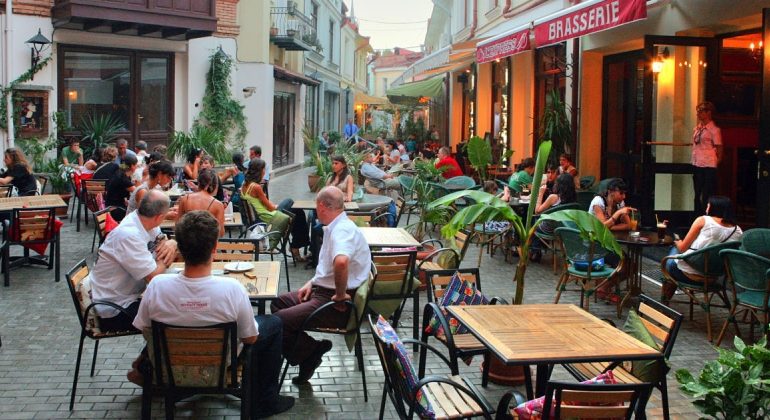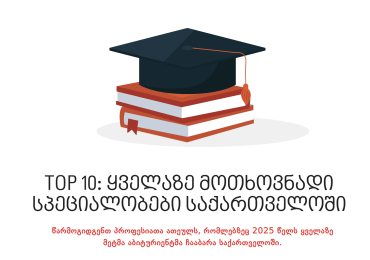FOR MANY YEARS, I have traveled frequently to Georgia. Each time, I am surprised to see another step being made in the development of the country. For example, the appearance of high-rise modern buildings and infrastructure, or the high number of luxurious hotels that are popping up like mushrooms. Also, the increasing number of Georgian fine dining restaurants and bars, with a place for each person. The country even has a very decent annual GDP growth. Georgia seems to be in the summer of its 25-year existence. But could clouds be appearing in that blindingly blue sky? I would like to share with you some of my observations about this beautiful country and the way forward.
Let me start by saying that I consider Georgia to be a gem in the Dutch development bank FMO’s portfolio. The country’s international orientation, sound leadership, and willingness and capability to embrace new concepts are factors that contribute highly to the success of Georgia – not only in the region, but also beyond its borders.
Coming back to my economic weather forecast, I’d like to focus on three potential clouds in the sky: agrarian reform, tourism and capital market development.
As someone born and raised in the Netherlands, a country that has true agro-DNA and is one of the most developed agro sectors worldwide, I clearly see that Georgia has massive agro potential. The country produces, in no particular order: tea, wine, meat, dairy, fruit and nuts. The fundamentals are certainly there, but why is it all so small scale? Is the state of the equipment, storage facilities and processing machinery really helping support more efficient and effective production? And what about the quality of the products? Are farming methods sustainable? If you truly want to make Agro an economic development pillar, where do you invest? The government, stakeholders in the sector and individual farmers should all partner to develop a long-term vision and make the necessary investments. The question is: who will step up and lead this reform? In my opinion, a strategic masterplan needs to be drafted, but it also comes down to actual implementation. Make choices about which crops you want to grow, make use of the profound knowledge of farmers, invest in innovative equipment and technology and build infrastructure that guarantees excellent product quality from farm to plate. The stakeholder’s community should be broadened beyond the usual suspects. The industry must welcome new information technology like drones and blockchain, as well as input from agro universities and sustainable farming NGOs. Can the financial sector play a role here? Yes, it certainly can, and it should. Banks and microfinance institutions have a profound knowledge of practically the whole supply chain, ranging from financing small-scale farmers to exporting agro products worldwide. The financial sector can take the roles of matchmaker, financial facilitator of agro product streams and center of excellence where knowledge meets finance.
A second possible could well be tourism. Last year Georgia celebrated the milestone of welcoming more than six million visitors, are markable achievement. One of them was my fellow countryman Jesper Black, who (as the sixth millionth tourist) got the red carpet treatment from the Prime Minister himself, who showcased famous Georgian hospitality. The video clip of his visit went viral worldwide. Tourism in the country can really develop into another economic pillar. First of all, I will not focus on the vulnerability of the tourism sector to external shocks. Being a number-one tourist destination might change overnight due to political, financial or geopolitical shocks. Let’s take that as a given. The question is: what kind of tourist destination does Georgia want to become in the next five to 10 years? The answer to this question will largely determine where efforts and investments in infrastructure are needed. Backpackers, for example, have less money to spend and are looking for cheaper accommodation, bars and restaurants. They will most likely travel by public transport. But one can also ask if Tbilisi is ready to absorb the growing number of Airbnbs hosting city visitors? And will smaller hotels in the countryside be able to meet the growing demand for more luxurious facilities without negatively influencing the environment? The point is that someone must step forward to make the tourism sector sustainable. Again, close cooperation is needed between parties to address this theme: how will growing tourism lead to less negative environmental impact? Alliances need to be sought between the government and the tourism sector.
Last, but certainly not least, potential cloud number three on the horizon: capital market development. Being a banker for almost thirty years, I have worked in various countries and have seen many developments, including both sound developments and some that turned out less well. Let me start by saying that I believe that the measures and supervision by the National Bank of Georgia are of a very high standard. Furthermore, the cooperation between the National Bank, the Georgian government and the financial sector vis-à-vis the much-needed de-dollarization policy has been excellent. The measures were announced in December 2016 and came into effect in January 2017, and I can vividly recall a speech I gave in March 2017, stipulating the importance of the National Bank’s continued support of Lari funding for banks and MFOs. Almost one year later I can conclude that, fortunately, exactly that scenario has happened. Good measures were taken and are under way. Banks and MFOs have had the chance to adapt. For FMO, one of the funding partners of the financial sector, the National Bank and Georgian government were very open and willing to accommodate the issue of a Lari bond. The goal of this is to have more Lari-based funding, instead of foreign currency loans. So why is there a cloud on the horizon? The Georgian financial system can be easily divided into three blocks. First of all, the two big banks: TBC Bank and Bank of Georgia. Second, there are approximately eight smaller banks, and third is the MFOsector, with Crystal ranking in first place. Another division can be made between banks that are premium listed in London or have a majority foreign ownership. The activities of these banks on the Georgian Stock Exchange are limited, as it focuses mainly on local bonds and small-share transactions. I think the Georgian Stock Exchange could use a revamp – active dual listing, stimulating listing by foreign banks, developing liquidity instruments and the provision of long term funding to important sectors of the economy would all help the exchange. The Georgian Stock Exchange can play a vital role in developing the capital market, where domestic resources are being catalyzed. By implementing rules of transparency from other international stock exchanges, the Georgian Stock Exchange can become the barometer of Georgian business activity. From a developmental point of view: I would embrace the concept of Sustainability Bonds and Green Bonds being issued on the Georgian Stock Exchange.
This brings me to my conclusion. Given the way the country is developing, Georgia certainly has a bright and shiny outlook, as it is full of possibilities. If the right choices are made, the potential clouds will disappear and Georgia can enjoy a prosperous and sustainable future.
















